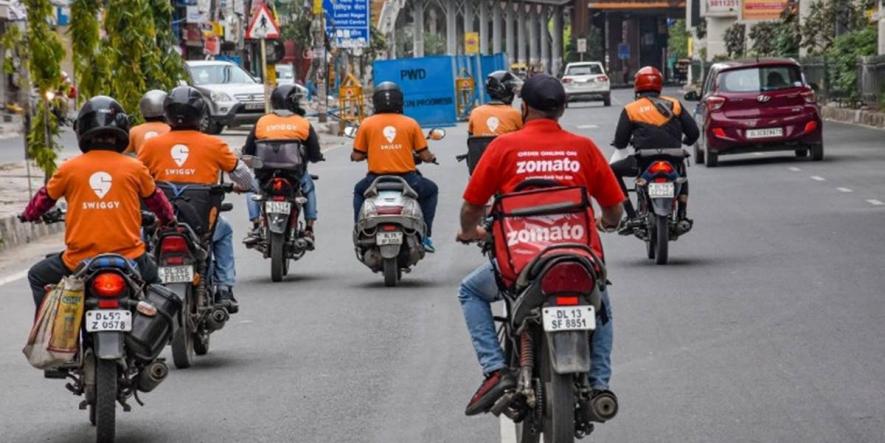Long Hours, no Benefits or Recognition: Tales From Gig Economy in Kolkata

Image credit: PTI
Kolkata: Demanding to get identified as delivery workers rather than "delivery partners," hundreds of gig and informal sector workers gathered in Kolkata at Krishnapada Memorial Hall and discussed ways to strengthen their movement in West Bengal.
The convention was presided over by Debanjan Chakraborty. Sagnik Sengupta, Kolkata district secretary of the All India Gig Workers' Union, presented the proposal at the convention. The speakers included Debasis Roy, general secretary of CITU Kolkata District Committee, and Surajit Ghosh, a leader of the All India Gig Workers' Union.
Long Hours Without Any Benefits
Subhojit Bera, a 26-year-old informal sector worker, receives no Provident Fund (PF) or ESI benefits. Unlike the organised sector, he does not possess any appointment letter.
Bera told NewsClick that he had to stop his education at Behala Sarsuna College after getting attacked for his political activism. He works as a painting site supervisor, earning around Rs 12,000/month.
Despite working long hours all month, Bera does not get the privileges he deserves. The story is similar for other gig and informal sector workers.
"We are fighting to get a toehold in society," Bera said, a member of the Gig and Informal Sector Workers' Union affiliated with the Centre of Indian Trade Unions (CITU).
Dismayed by his work conditions, Bera is contemplating moving to Gurgaon, where he hopes to earn around Rs 22,000-24,000/month.
"There are no opportunities in West Bengal. The ones like us who get jobs are paid meagre wages. It is impossible to support a family with Rs 12,000/month," Bera said.
Prasanta Ghosh, a 48-year-old gig economy worker for food aggregator Swiggy, delivers food across Salt Lake on his bicycle.
Speaking to NewsClick, Ghosh narrated his ordeal of working more than 12 hours to make Rs 550 from his Swiggy job.
"We are supposed to get 14 deliveries in eight hours, but, in reality, it takes around 12-14 hours of log-in time to have 14 food deliveries. We have our set of problems. Despite working like mu-boli labour, we are accorded the status of labour. We are addressed as "delivery partners". Can you imagine the plight of a "delivery partner" when the company blocks their ID?" Prasanta Ghosh said.
No Government Willing to Address Workers' Exploitation
"We don't have accidental insurance, even on a mass scale. The accident insurance plans are linked to our work performance. It is an inhuman system," CITU leader Debasis Roy told NewsClick.
"Often, our riders face police harassment. Our company never takes any responsibility. The "delivery partners" are left to fend for themselves," he added.
Roy said their recent meetings had focused on the changing equations of employer-worker relations.
"Companies are treating workers as app-based "delivery partners." Urban Company, which has over 50,000 partners/workers across the country, trains workers after taking Rs 50,000 from them. Blinkit has 15 hubs in the city; each hub includes 400-500 employees working more than 10-12 hours. Recently, Urban Company employees went on strike in multiple locations. Despite that, the state government did not mediate and obey its role as a negotiator in industrial disputes. The Rajasthan government has taken some proactive measures by having rules for this sector, but other state governments have yet to take concrete measures."
Roy mentioned that the West Bengal government had recently stated that they are contemplating a bill regarding app-based aggregators.
"However, no government is taking steps to address the whole issue of exploitation of partners who are at the receiving end of the operations in these entities. The platforms are intermediaries between the service providers and service getters. We are taking steps to foster a larger movement taking along all sections of the workers involved in these sectors," Roy added.
Get the latest reports & analysis with people's perspective on Protests, movements & deep analytical videos, discussions of the current affairs in your Telegram app. Subscribe to NewsClick's Telegram channel & get Real-Time updates on stories, as they get published on our website.
























